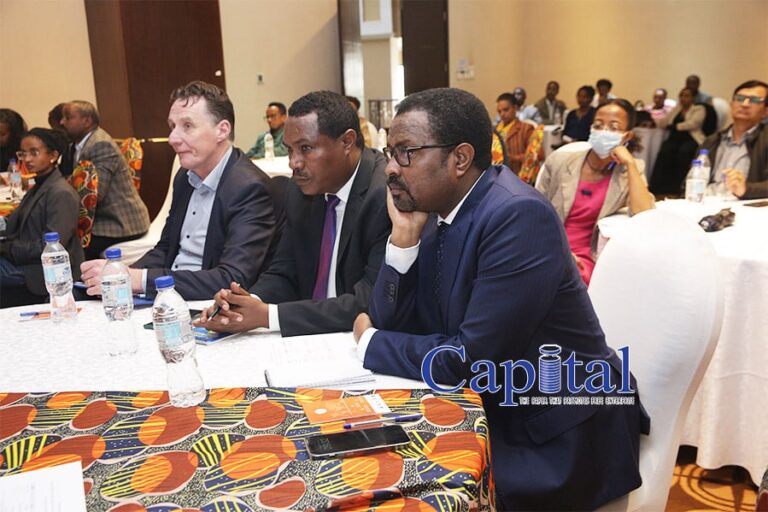Lilian Babirye, the Country Manager of MSC Uganda, has emerged as a leading figure in the logistics sector, particularly in optimizing coffee distribution across Africa. With a career spanning over two decades, Babirye’s journey from an office assistant to a key executive reflects her commitment to excellence and innovation in the field of logistics.
Under her leadership, MSC Uganda has undertaken initiatives to streamline coffee distribution processes, leveraging advanced technology and strategic partnerships to enhance efficiency and quality. Babirye’s insights shed light on the challenges and opportunities in coffee distribution and the transformative impact of logistics solutions in the industry.
Babirye emphasizes the importance of specialized containers and tracking devices in maintaining coffee quality during transportation. MSC’s food-grade containers, equipped with ventilation and tracking devices, ensure that coffee beans remain fresh and uncontaminated throughout the journey. Additionally, the implementation of an online booking system has streamlined the booking process, providing transparency and efficiency for shippers and forwarders alike.
Despite the benefits of streamlined logistics, Babirye acknowledges the challenges involved in ensuring timely coffee shipments from key ports. Infrastructure limitations and import regulations pose significant hurdles, impacting schedule reliability and supply chain efficiency. However, Babirye remains optimistic about the potential of initiatives like the African Continental Free Trade Agreement (AfCFTA) to bolster regional trade networks and support the growth of African businesses.
Babirye highlights innovative approaches such as smart containers, which enable real-time monitoring of cargo conditions, including temperature and humidity levels. By leveraging technology, coffee professionals can ensure the integrity and quality of coffee beans throughout the transportation process, ultimately enhancing the export potential of African coffee.
As the African coffee industry continues to evolve, Babirye emphasizes the pivotal role of logistics in optimizing distribution and export processes. While challenges persist, including trade barriers and competition among coffee-producing countries, Babirye remains committed to driving innovation and efficiency in coffee logistics, thereby contributing to the growth and sustainability of the industry.
Through her strategic leadership and unwavering dedication, Lilian Babirye is spearheading a logistics revolution in the African coffee sector, empowering businesses and fostering economic growth across the continent. Excerpts;
Capital: What are some effective strategies for optimizing coffee distribution in producer countries?
Lilian Babirye: Optimising coffee distribution in producer countries requires effective strategies that encompass various aspects of logistics. One such strategy is the establishment of a robust presence, exemplified by MSC’s collaboration with major stakeholders in the logistics chain. Through this collaboration, MSC provides essential equipment, documentation, and logistical services, facilitating the extended distribution of coffee worldwide. As part of this effort, MSC has implemented several initiatives:
- MSC has established three equipment yards in Uganda and two in Kenya. These yards have a significant capacity, capable of holding approximately 1,000 TEUs (Twenty-foot Equivalent Units) in each country at any given time. This infrastructure ensures the availability of necessary equipment for coffee transportation and distribution operations.
- MSC has developed an online booking system that streamlines the process for shippers and forwarders. This system allows it to place and monitor bookings seamlessly, from the initial booking stage to the issuance of electronic Bills of Lading (e-BL). By providing transparency and efficiency in the booking process, this system enhances overall logistical operations and contributes to smoother coffee distribution processes.
Capital: How can specialized containers contribute to maintaining coffee quality during transportation?
Lilian Babirye: Coffee containers are food grade containers that are ventilated for aeration and have hooks to enable placing of bulk bags and container dryer bags when required.
Food grade containers are non-smelly, no rust in or out, no oils spillages, no holes, intact floorboard which avoids contamination of any nature thus ensuring quality maintenance.
MSC also has a tracking device solution that enables tracking of containerised cargo from door to door via a satellite visibility.
Capital: What challenges are involved in ensuring timely coffee shipments from key ports?
Lilian Babirye: Infrastructure:
- Road conditions.
- Port infrastructure and equipment that impact the productivity of the port generating port congestion and impact the schedule reliability.
- Import regulations from different regions:
- Fumigation required in some markets.
Capital: What is the current impact of the African Continental Free Trade Agreement (AfCFTA) on the coffee trade?
Lilian Babirye: African governments and businesses are actively seeking new private sector investment to bolster supply chains as the continent pursues industrialisation. MSC’s strategic approach aligns with this objective by facilitating the implementation of the AfCFTA. Through its investments and operational initiatives, MSC contributes to strengthening regional trade networks and supporting the growth of African businesses, thus advancing the goals of economic integration and industrial development across the continent.
Capital: How can coffee professionals leverage the networking opportunities at the African Fine Coffees Conference (AFCC) to improve their distribution strategies?
Lilian Babirye: This question is best for the organisers as MSC only works with clients who transport the commodity.
Capital: What are some innovative approaches or technologies that can be used to improve coffee distribution in producer countries?
Lilian Babirye: MSC offers smart containers to coffee exporters and traders. By smart container we designate it as a standard dry container, equipped with an internet-connected device, designed to generate a wide range of data, e.g. position, movement, temperature, door openings and shocks.
Using this technology, our customers can better monitor the progress and condition of their cargo and get notifications and alerts on critical events throughout its journey.
For instance, customers can track cargo location and continually monitor temperature and humidity levels throughout transport. This feature is essential as a build-up of humidity can detrimentally affect the quality of the coffee beans. Using our smart containers, customers ensure the integrity and quality of their coffee beans from point A to B.
Capital: How does the quality of coffee impact its distribution and export potential?
Lilian Babirye: Like for any food product, if the product is good from the pickup, quality will remain the same during the transport and at the delivery. There are stuffing processes for containers that must be respected by exporters/ producers, and if they aren’t, this can damage the quality of the product.
Capital: What role does logistics play in optimizing coffee distribution, and what are some best practices in this area?
Lilian Babirye: Logistics plays a pivotal role in optimising the distribution of this commodity. Thus, MSC offers a comprehensive suite of hinterland and logistics solutions that bolster the African coffee industry. These encompass road and rail transportation, and warehousing, packaging, distribution, as well as value-added services like quality control and traceability. These solutions are instrumental in maintaining the quality and freshness of coffee beans throughout the storage, packaging, and the effectiveness in the transportation phases.
Capital: What are the potential benefits and challenges for coffee producers in Ethiopia with regards to the implementation of the AfCFTA?
Lilian Babirye: Lilian takes care of Rwanda and Uganda coffee market; however one challenge is that Rwanda or Uganda coffee production compete with Ethiopia’s production and reduce revenue form coffee beans production. Since trade barriers and restriction will be eliminated, facilitating the circulations of goods.










